Welcome to Trail Guide, your host through the wilds of the 2016 presidential campaign. It’s Tuesday, Feb. 2, and here’s what we’re talking about:
- Hillary Clinton eked out a win in Iowa over Bernie Sanders
- She’s already campaigning hard in New Hampshire to convince voters she’s the most electable Democrat
- Candidates arrived in New Hampshire in a sprint to gain ground before next week’s primary
- Ted Cruz held off Donald Trump and Marco Rubio surged to a close third in the Iowa caucuses. See the full results
- Go inside an Iowa caucus precinct with The Times: “the only thing people get excited about here”
- See how well the polls fared
- Share via
Subdued Donald Trump wants more credit for second place
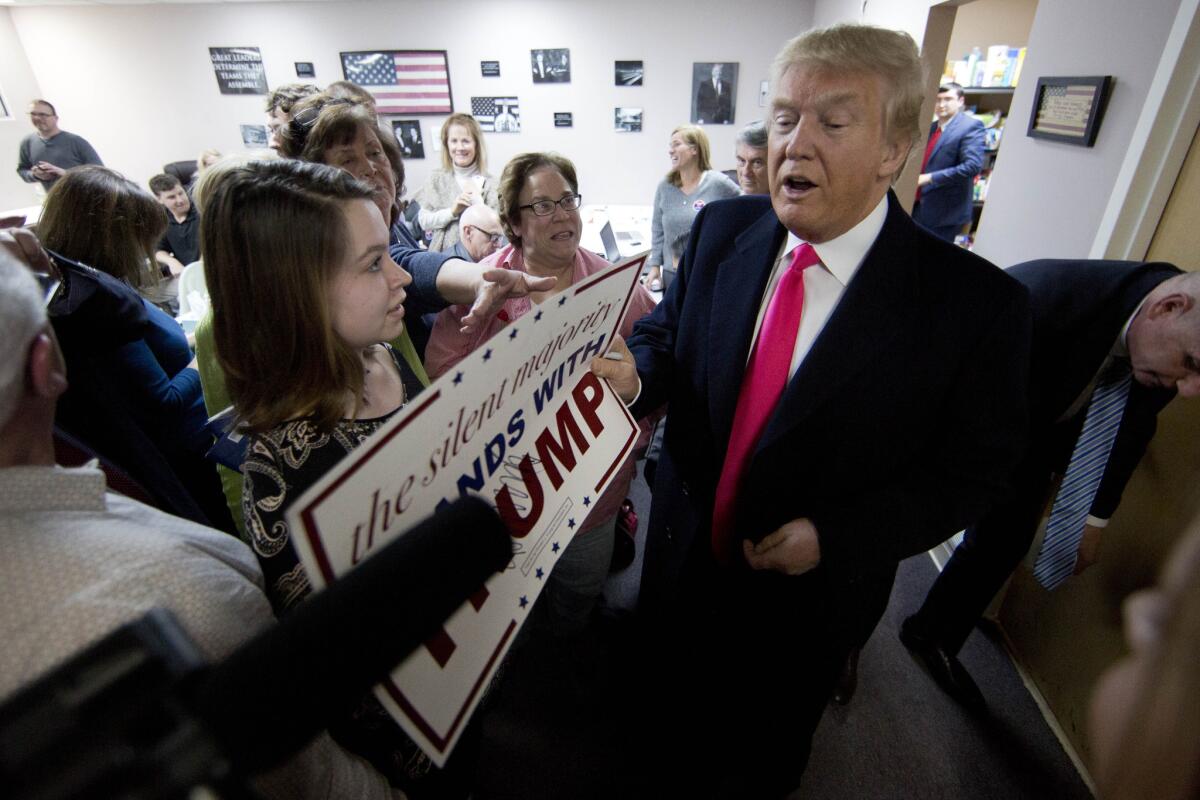
He “could have been a little better, could have been one notch better,” Donald Trump conceded Tuesday, but insisted that “most people say I did a great job.”
Trump’s news conference in New Hampshire on Tuesday evening, his first session with reporters since finishing second in the Iowa caucuses to Texas Sen. Ted Cruz, was Trumpian, in many respects, with frequent tangents and references to his own success and how it should be judged.
But a key difference was notable: his delivery was subdued. The candidate, who constantly bills himself as the gold standard of winning, seemed annoyed that others were now taking shots at him for falling to second place.
“People didn’t talk about my second place. They didn’t talk about it as positively as they should have,” he said, sounding frustrated with the attention given to Florida Sen. Marco Rubio.
“And yet with Marco, who was more than 2,000 votes behind me -- that’s a lot of votes, by the way -- they said, ‘Oh, he’s surging, he’s surging.’ So I don’t know why is the third place doing well.”
Trump, who received the endorsement of former Massachusetts Sen. Scott Brown, suggested that his decision to boycott a Fox News debate may have played a role.
“I think some people were disappointed that I didn’t go in the debate,” he said. “If I had it to do again, I’d do the exact same thing.”
Trump said that his event for veterans raised $6 million, making it worth a second-place finish if that was the cost. He also took a shot at Cruz, some of whose supporters had spread a rumor on caucus day that Ben Carson, the retired neurosurgeon, was dropping out.
“That was a disgrace,” Trump said.
Cruz has apologized for the incident.
Trump insisted he was not feeling pressure to win New Hampshire’s primary next Tuesday. He has been heavily favored in polls in the state for months. But perhaps learning a lesson about the expectations game, he took the step -- unusual for him -- of downplaying his chances.
“I’d love to finish first,” he said. But if he doesn’t win there, he insisted, “it would still not be horrible because you’re competing against a lot of very talented people that have been politicians all their lives. I’ve been a politician for six months.”
- Share via
Trump sounds off about Iowa caucuses
They didn’t talk about my second place. They didn’t talk about it as positively as they should have.
— Donald Trump, talking about the media at a news conference Tuesday night in New Hampshire. On Monday, he finished second in the Iowa caucuses.
- Share via
How much did GOP candidates spend per vote?
- Share via
Sanders and Clinton offer differing fundraising pitches after narrow Iowa contest
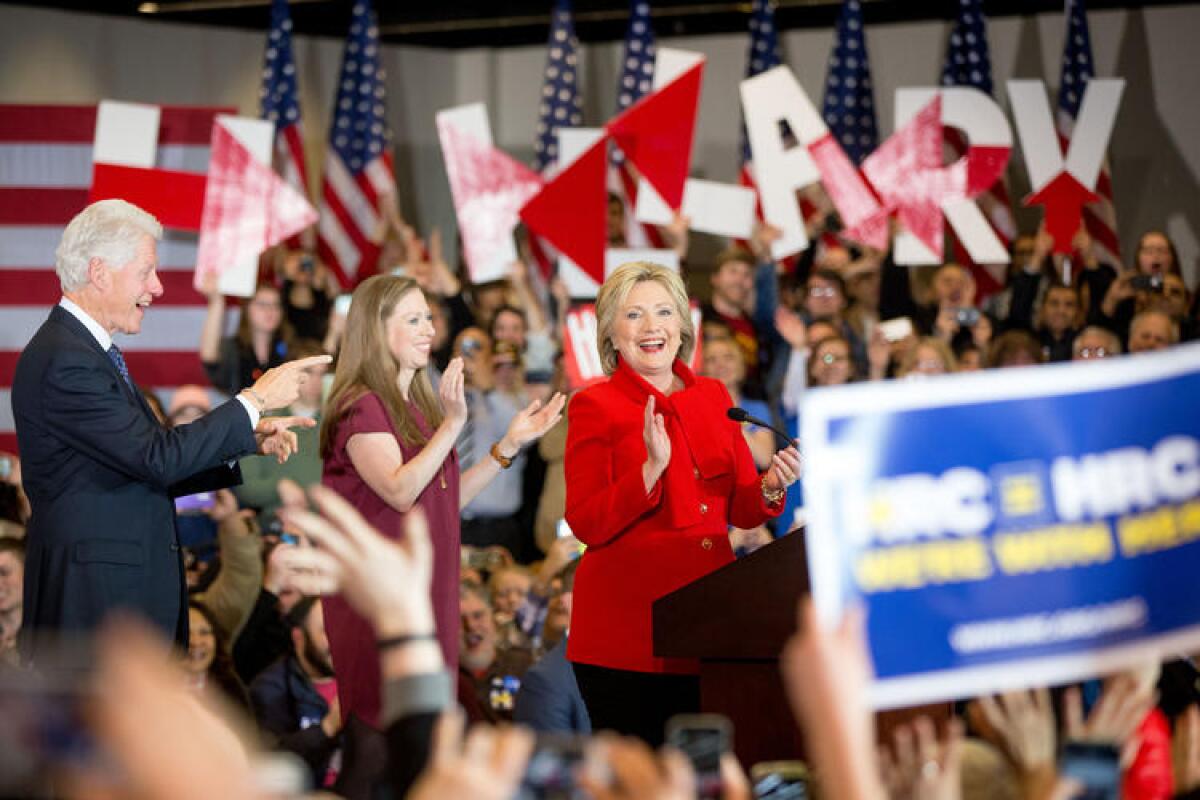
Hillary Clinton’s razor-thin victory over Bernie Sanders in the Iowa caucuses has both campaigns spinning the results Tuesday in their efforts to raise money.
Clinton called her narrow win (49.9% to 49.6%) in the state “historic,” while Sanders labeled his showing as a shock to the political world.
“We won Iowa! Thank you,” Clinton wrote to supporters in a fundraising email on Tuesday.
The former secretary of State urged backers to donate a minimum of $50 to her campaign as the race heads to New Hampshire.
Sanders, whose campaign treasury has swelled with millions of small donations, asked supporters to make as little as a $3 contribution.
“I think the people of Iowa sent a very profound message to the political establishment, to the economic establishment, and to the media establishment,” he said in his fundraising pitch.
Sanders, a self-described democratic socialist, overcame a deficits in the double digits in the Hawkeye State with his vow to fix income inequality.
The senator from Vermont holds a nearly 20 percentage-point lead over Clinton in New Hampshire – where voters will cast ballots Feb. 9 – based on an average of several state surveys.
- Share via
Marco Rubio is peaking as planned, but will ‘Marcomentum’ continue?
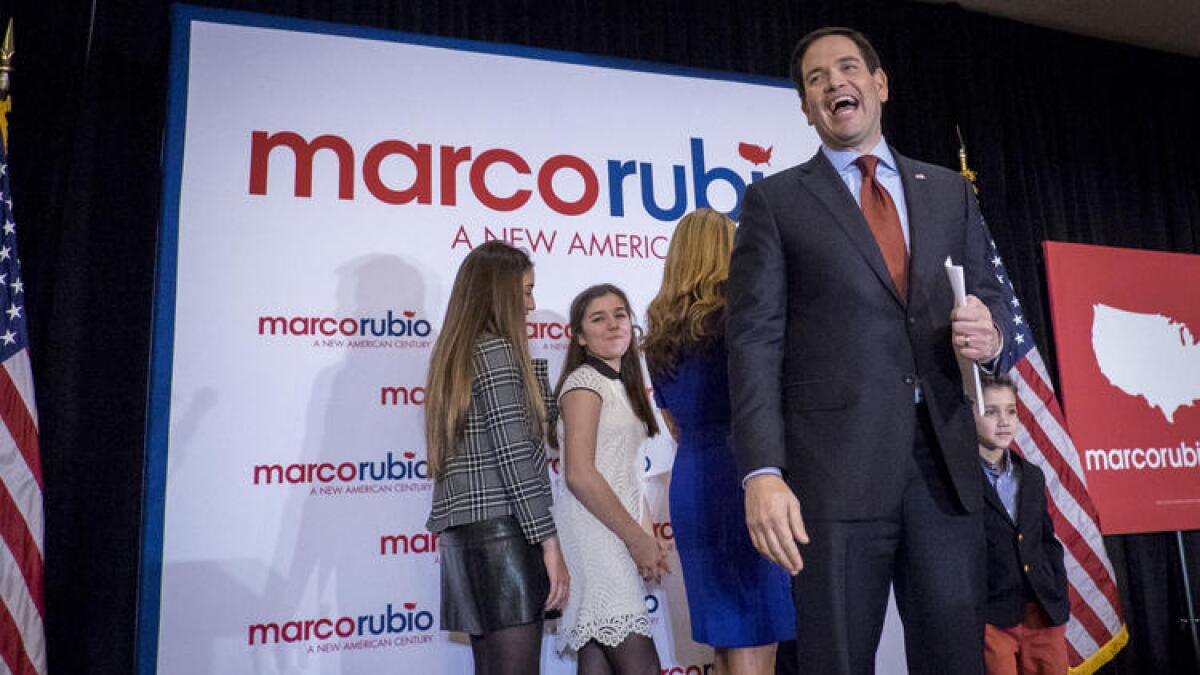
Marco Rubio’s strong third-place finish in Iowa surprised many after his lackluster performance in the polls, but his ability to capitalize on the momentum will prove more difficult as he positions himself as the GOP’s best hope against the Democrats.
Team Rubio always expected the Florida senator to begin to peak around this time. The campaign takes a long view of the 2016 nominating contest, a strategy that looked increasingly risky as rivals Sen. Ted Cruz and Donald Trump soared.
But exit polls show Rubio drew support not only from Iowans who made up their minds in the final days, but also from those looking for a viable candidate who can win in November.
Rubio’s backers now call it a three-way race with Cruz and Trump, dismissing the remaining seven main GOP contenders. They see Rubio as the best alternative to the hard-line Texas senator and the billionaire reality star in the battle against the Democratic nominee.
- Share via
Iowa caucuses net record ratings for cable news
The 2016 race for the White House is the ratings gift that keeps on giving for cable news.
Fox News Channel, CNN and MSNBC all saw their largest audiences ever for coverage of the Iowa caucuses on Monday, as Sen. Ted Cruz was victorious on the Republican side and Hillary Clinton squeaked out a victory over Sen. Bernie Sanders in her quest for the Democratic nomination.
- Share via
So how badly did the Iowa polls do?
Donald Trump loves to talk about them, most candidates pretend to ignore them, and lots of voters get sick of them, but polls have a ubiquitous role in American politics.
How’d they do in Iowa?
On the Democratic side, not bad. On the GOP side, worse.
Most of the final polls of Iowa voters correctly predicted a very tight race between Hillary Clinton and Sen. Bernie Sanders, one well within the surveys’ expected margins of error.
There were some exceptions, including a widely publicized CNN poll that had Sanders winning by 8 percentage points and a couple of lesser-known surveys showing double-digit margins for Clinton. But while none of the polls exactly predicted the near tie that happened, several accurately projected a race that was too close to call.
The Republican contest gave pollsters more trouble. Of the most recent round of polls, only a survey by Iowa State University correctly projected that Sen. Ted Cruz of Texas would defeat Trump. The Iowa State survey also was among the closest to the actual results on the Democratic side.
But the Iowa State poll, which was taken over an unusually long period from Jan. 5-22, missed the late surge by Sen. Marco Rubio of Florida, which carried him into a near tie with Trump. The poll projected Rubio to get only 12% of the vote. In fact, Rubio ended with 23%, Trump with 24%.
A couple of late polls did show Rubio moving up, but one that did quite well on that score, a survey by Emerson College, was off significantly on the Democratic side.
On average, the recent polls overstated Trump’s eventual support by about 6 percentage points. Or, to put the situation differently, Trump’s campaign underperformed by that much while Cruz’s campaign, which put great emphasis on its sophisticated get-out-the-vote operation, beat projections by about 4 points. Rubio beat the polling average by about 6 points.
The state’s best-known survey, the Iowa Poll, sponsored by the Des Moines Register and Bloomberg, correctly forecast a tight race among the Democrats, but had predicted a 7-point win by Trump.
The poll significantly underestimated the share of the Republican vote that was cast by evangelical Christians, a group that went heavily for Cruz. It estimated evangelical Christians would make up 47% of the electorate; the actual figure was 62%, according to the entrance poll conducted for the television networks and the Associated Press.
A similar error hurt the poll in 2012, when it underestimated the support for former Sen. Rick Santorum, another evangelical favorite, who won the Republican caucuses that year.
- Share via
Low-level bribery and a raucous crowd: We take you inside an Iowa caucus precinct
Every four years, Democrats in Iowa forgo ballots and other modern vote technologies in favor of what some claim to be the nation’s most authentic form of democracy. At more than 1,000 caucus precincts like the one at Merrill Middle School in Des Moines, participants are encouraged to argue on behalf of their favored candidates, and the outcome ultimately comes down to a hand vote.
The process is sometimes described as quirky, or messy, or arcane.
But ultimately, it is human. And therefore, not always perfect.
- Share via
Hillary Clinton in New Hampshire: Under the gun and shaking every hand
Earlier in her campaign for the presidency, Hillary Clinton was criticized for cutting and running at some events, for not enduring the seemingly endless parade of hands to shake after her speech ended.
Not anymore.
In New Hampshire on Tuesday, she shook hands, listened in to comments -- even helping lift an elderly woman out of a wheelchair so that a picture could be taken -- for an extended period after her speech.
Clinton is only too aware that she enters the New Hampshire phase of the campaign having just escaped a loss in Iowa and facing a huge deficit against Vermont Sen. Bernie Sanders, who was also in the state on Tuesday revving up voters.
Supporters of Clinton said they hoped voters here would heed the Iowa results and side with Clinton’s argument that she is best suited to be president, despite Sanders’ next-door-neighbor status.
On Feb. 9, we’ll know if they’re right. And then the campaign will move on to territory more hospitable to Clinton, namely South Carolina and Nevada, where more moderate Democrats and minority voters who are strongly in her camp will have more of a say.
- Share via
A familiar scene in New Hampshire (if you can see it)
There’s no snow in New Hampshire this week, and the weather is oddly warm. But there is something familiar: Bill Clinton, on a rope line, sucking in the applause, and talking. Always talking.
That crown of white hair in the middle of the picture? That’s him. (Hillary Clinton was not in photo range.)
- Share via
For Jeb Bush, New Hampshire is a ‘reset’ to the race
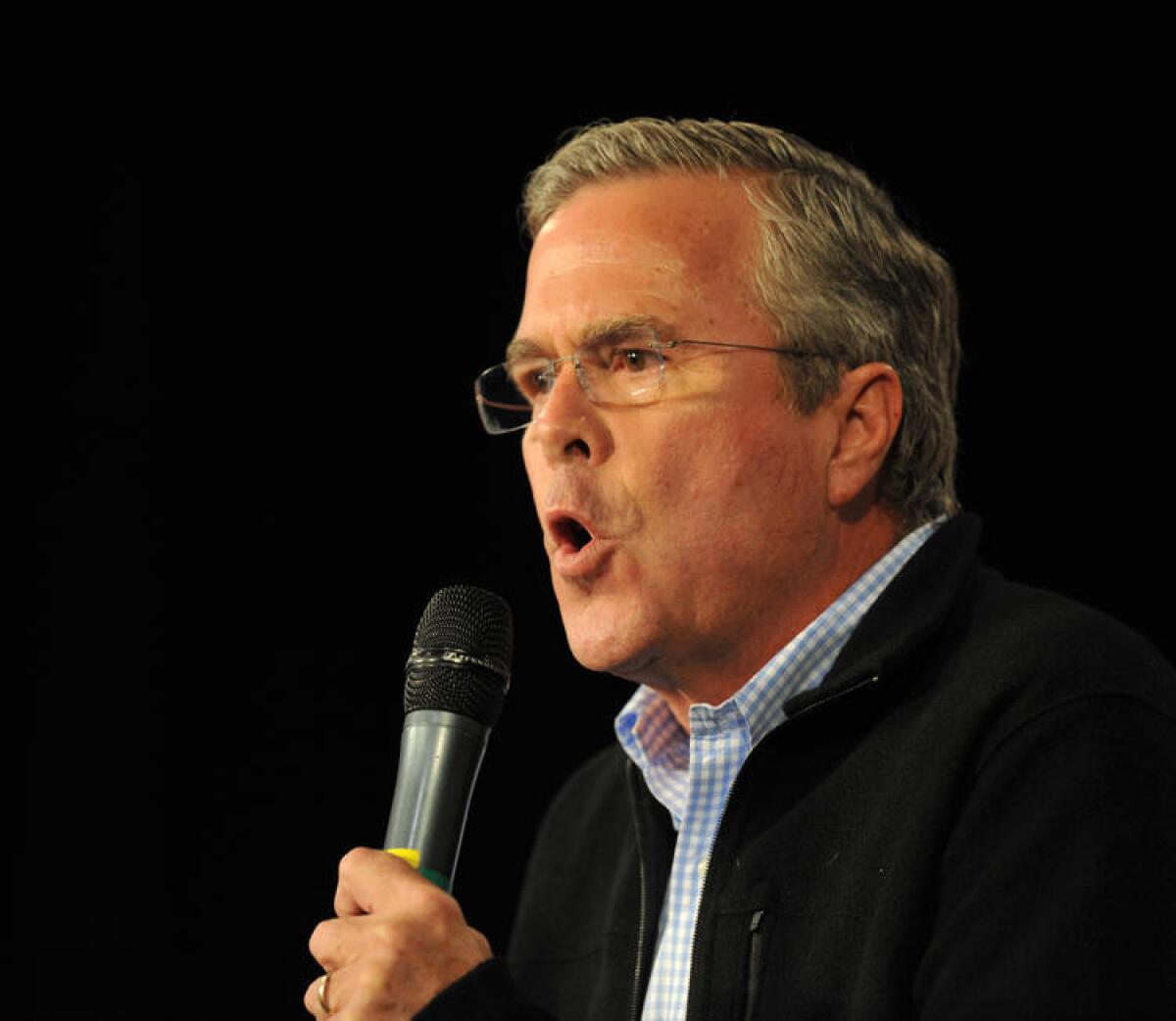
With New Hampshire now at the fore of the 2016 election, former Florida Gov. Jeb Bush on Tuesday sought to cast the first-in-the-nation primary as a potential game changer in the race for the Republican nomination.
“We come to New Hampshire, where New Hampshire has a tendency to reset the race,” Bush said on Fox News.
For several weeks, Bush has banked heavily on New Hampshire. Before caucus-goers in Iowa even began to cast ballots on Monday, Bush departed for Manchester, where he held an evening rally.
In Iowa, where the GOP caucus participants consist mostly of Christian conservatives, Bush finished in fifth place with about 2.8% support. When asked Tuesday if he would have done anything different with his campaign in Iowa, Bush demurred.
“It’s over and you move on to the next race,” Bush said. “I’m 62 years old. I have a life 32 years in business and eight years as governor. I don’t look back.”
Bush and Ohio Gov. John Kasich, both part of the establishment wing of the party, have tossed most of their resources into New Hampshire.
- Share via
Hillary Clinton: ‘We are in a fight to the finish’ after winning Iowa
Hillary Clinton immediately sought to dispel any doubt Tuesday about Iowa Democratic caucus results, declaring as she took the stage in New Hampshire how thrilled she was to start the campaign here “after winning Iowa.”
“I’ve won and I’ve lost there, and it’s a lot better to win,” she said.
As Clinton spoke, whether she could truly claim a victory was still a matter of debate. She held a slim lead after nearly 1,700 precinct-level contests were tallied, some of which awarded delegates based on coin tosses. Later Tuesday, the Iowa Democratic Party declared her the winner, as did the Associated Press, by three-tenths of a percentage point.
But Clinton, the former secretary of State, argued that she was arriving in New Hampshire with momentum, and used her remarks here to cast herself as the natural successor to the most recent, and, she argued, successful Democratic presidencies.
“We are in a fight to the finish about whether or not we’re going to build on the progress we have made or watch it get ripped away,” she said. “And New Hampshire is going to have to decide who can go toe-to-toe with the Republicans to make sure they don’t wreck us again.”
Clinton is a decided underdog in the weeklong campaign ahead of the first-in-the-nation Feb. 9 primary. Sen. Bernie Sanders of neighboring Vermont has an 18-point advantage, according to the Real Clear Politics average of recent public polling.
But New Hampshire voters can change their minds in a hurry, as the Clintons know through their own close connection to the state.
“We have the luxury here in New Hampshire of waiting until the last minute. So we do,” said Terry Shumaker, a longtime Clinton ally in New Hampshire who served as an ambassador during Bill Clinton’s administration.
- Share via
Iowa Democrats finish count, declare Clinton winner
After tracking down some errant precincts, the Iowa Democratic Party on Tuesday announced Hillary Clinton edged Bernie Sanders by 0.3% in Monday’s caucuses.
The state party does not release raw totals, but rather how many delegates to the state convention each candidate received in Monday night’s caucuses. The Associated Press also called the race for Clinton on Tuesday.
Clinton received 700.59 state delegates and Sanders received 696.82. Former Maryland Gov. Martin O’Malley, who suspended his campaign Monday night after a poor showing, received the support of 7.61 delegates.
The party said it was unable to release a complete tally Monday night because it was unable to get in touch with some of its precinct captains.
- Share via
Democracy in action with the flip of a coin
Coin tosses aren’t just used to decide who kicks off football games -- Iowa Democrats were tossing quarters in the air on Monday night to break ties at caucus sites.
Hillary Clinton was able to win a few more delegates after the coins landed in her favor, but not enough to make a decisive difference in the extremely close race, according to the Des Moines Register.
“It’s a very rare situation,” said Pete D’Alessandro, the Iowa campaign coordinator for Sen. Bernie Sanders.
Here was the scene in West Davenport.
And here’s what happened at a caucus site in Des Moines.
- Share via
A tweetless Trump? The front-runner stuns the world with huge gap in social media
So what happens when Donald Trump loses an election? He stops tweeting.
Let the record show that Trump stopped tweeting for more than 15 hours between Monday night, before the Iowa caucus results were announced, and Tuesday morning.
The caucus results showed him losing to Sen. Ted Cruz, a tough blow for a guy who has fashioned himself as unconquerable and once said this about second place:
He was silent until Tuesday morning. That’s a rare gap for a candidate who has reinvented the Art of the Tweet. His tweet gap lasted so long that Politico instituted a clock Monday morning to mark the time.
Around 11 a.m., Trump broke his silence with a sudden appreciation of being the runner-up.
- Share via
The New Hampshire campaign begins after Hillary Clinton’s narrow escape in Iowa
Hillary Clinton might have wanted to come into New Hampshire with a big blast of Midwestern momentum to offset Bernie Sanders’ expansive lead in the state next door to his.
Instead, their near-tie in Iowa on Monday night means this will be another New Hampshire campaign where a Clinton tries to come from behind, starting soon with her morning event in Nashua.
- Share via
The ads arrived in New Hampshire before the candidates did
If polls are to be believed, both the Republican and Democratic presidential contests in New Hampshire are wipe-outs waiting to happen when voters here cast ballots Feb. 9.
Businessman Donald Trump was 18 percentage points ahead of his nearest Republican rival, Texas Sen. Ted Cruz, in a CNN/WMUR poll released Sunday. Vermont Sen. Bernie Sanders was 23 points ahead of Hillary Clinton in the Democratic race.
But no one believes -- or wants to believe -- that those numbers will hold, particularly given the dramatic results in Monday’s Iowa caucuses. And New Hampshire is well known, anyway, for tweaking its views after Iowa, often going in the opposite direction.
Trying to gain advantage, the candidates and their allies have flooded New Hampshire’s airwaves with ads.
The fiercest one, in sustained rotation, was a Trump ad that uses a stumbling Cruz interview with Fox News anchor Bret Baier to paint Cruz as a hypocrite on immigration. That ad seems all the more pointed now that Trump has come in second to Cruz in Iowa.
Trump uses the interview to argue that Cruz favors legal status for those in the country without proper documentation. Cruz denies that, although his own words and an amendment to the 2013 Senate immigration bill have been used to contradict him.
Trump leaps over the line of truth in the ad, arguing that “we have people pouring in, they’re pouring in and they’re doing tremendous damage.”
Actually, the number of immigrants in the country illegally is dropping, as numerous studies have shown.
Cruz has responded with an ad touting his own role in a terrorism case and calling himself “tested, trusted, ready to lead.”
Elsewhere in the Republican race, the battle has raged for prominence among candidates most closely aligned with the party’s establishment wing.
Former Florida Gov. Jeb Bush’s allies are running ads dunning Ohio Gov. John Kasich as “wrong on New Hampshire issues” and Florida Sen. Marco Rubio as “not ready to be president.” Kasich is accusing Bush of being “not presidential.” Rubio is citing Bush -- and Clinton -- as “two names from the past with ideas from the past” and saying “it’s time for a new generation.” By that, Rubio means himself, and he won some credibility for that argument with his third-place finish Monday.
Speaking of the past, a 1968 song by Simon and Garfunkel was the narration for an evocative Bernie Sanders ad running now in New Hampshire, as it has in Iowa.
Sanders was also airing ads pledging to protect seniors from any cuts in Social Security.
Clinton, meantime, was going less for poetry than for reassurance as she fights off a strong Sanders challenge that left them essentially tied in Iowa.
New Hampshire voters know her well; they rescued her candidacy in the 2008 primary before her eventual loss to Barack Obama later in the campaign. And they know her competitor well too, since he resides next door.
So her argument played less on personality and more on impact. Of people across the country, she said, “I’m going to bat for them every day.”
The narrator then adds: “She has what it takes to get things done.” The suggestion: Sanders means well, but he’ll be blocked in Washington.
- Share via
Iowa Democrats declare Clinton the winner as they seek to downplay tallying woes

The Iowa Democratic Party declared Hillary Clinton the winner of the Iowa caucuses early Tuesday morning and downplayed the snafus that dogged their election night delegate tally.
One Des Moines precinct had still not reported its results, worth the equivalent of 2.28 delegates, not enough to push Bernie Sanders past Clinton, according to a statement released by party chairwoman Andy McGuire.
“We will report that final precinct when we have confirmed those results with the chair,” she said.
The drama unfolded Monday night when initial reports came out that some 90 precincts did not have chairs assigned to them, throwing the integrity of the caucuses into doubt.
An official with the state party denied that claim, but acknowledged that officials had been unable to reach the precinct chairs. By 2:30 a.m. local time, the number of precincts that had yet to report results was down to one.
The problems could provide fodder to critics who charge that Iowa should not hold the first presidential nominating contest in the nation, accusations that also surfaced after state Republicans faltered four years ago when Mitt Romney was declared the winner on caucus night, only to see the party change course and announce two weeks later that Rick Santorum had actually won.
By then, Romney had won New Hampshire and was on his way to the nomination.
- Share via
Ted Cruz credits his Iowa win to his ‘grass-roots campaign’
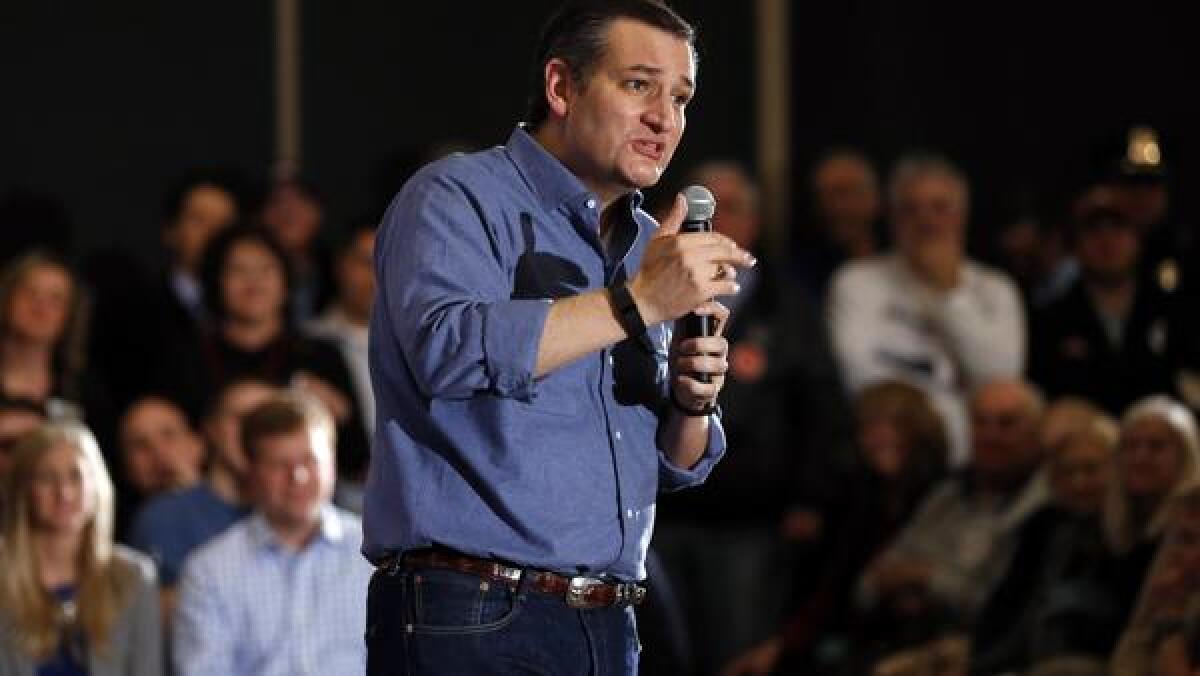
Ted Cruz credited his victory in the Iowa caucuses to his “grass-roots campaign” and deflected questions about whether he was helped by Marco Rubio siphoning support from runner-up Donald Trump.
One CNN reporter even asked whether Cruz sent Rubio flowers for stealing votes from Trump, but Cruz demurred.
“I’m focused on our victory tonight,” he told CNN’s Dana Bash on Monday. “I like and respect everyone in this race. Donald Trump and Marco both had a good night, I congratulate on their second- and third-place finish.”
Pressed on whether his victory seemed predetermined because of views that appeal to evangelicals, a crucial voting bloc in the Iowa caucuses, Cruz disagreed.
“I’m amused hearing Iowa’s tailor-made for us,” he said, adding that he felt most media had predicted he would lose in Iowa until the votes showed otherwise. “When the grass roots proved the media wrong, well then of course it was a foregone conclusion that Ted was going to win.”
- Share via
Marco Rubio: I’m Republicans’ ‘best chance’ at defeating the Democrats
Marco Rubio attributed his third-place finish in the Iowa caucuses to voters’ belated realization that he offers Republicans’ best chance at winning the White House as he sought Tuesday to portray the results as a success that will carry him to a win in New Hampshire.
“I give the party the best chance not just to unify the conservative movement but to grow it,” the Florida senator said in an interview on ABC’s “Good Morning America,” “to take our message to people that don’t vote Republican now, grow our party, grow our movement and defeat Hillary Clinton or Bernie Sanders.”
Rubio compared his votes to those of Iowa’s first- and second-place finishers in 2012, Mitt Romney and Rick Santorum, who each garnered about 25% support that year.
A new TV ad supporting Rubio aired Tuesday and sought to limit the field to just him and the two candidates who bested who him in the Iowa caucuses, Texas Sen. Ted Cruz and billionaire Donald Trump. It touts Rubio as the only contender who can beat the “Clinton machine.”
“Ted Cruz says Donald Trump has boatloads of liberal positions,” a narrator said in the ad. “Donald Trump says Ted Cruz can’t beat the Democrats. Well, they’re both right.”
- Share via
Analysis: New Hampshire promises tough fight and shift in tone
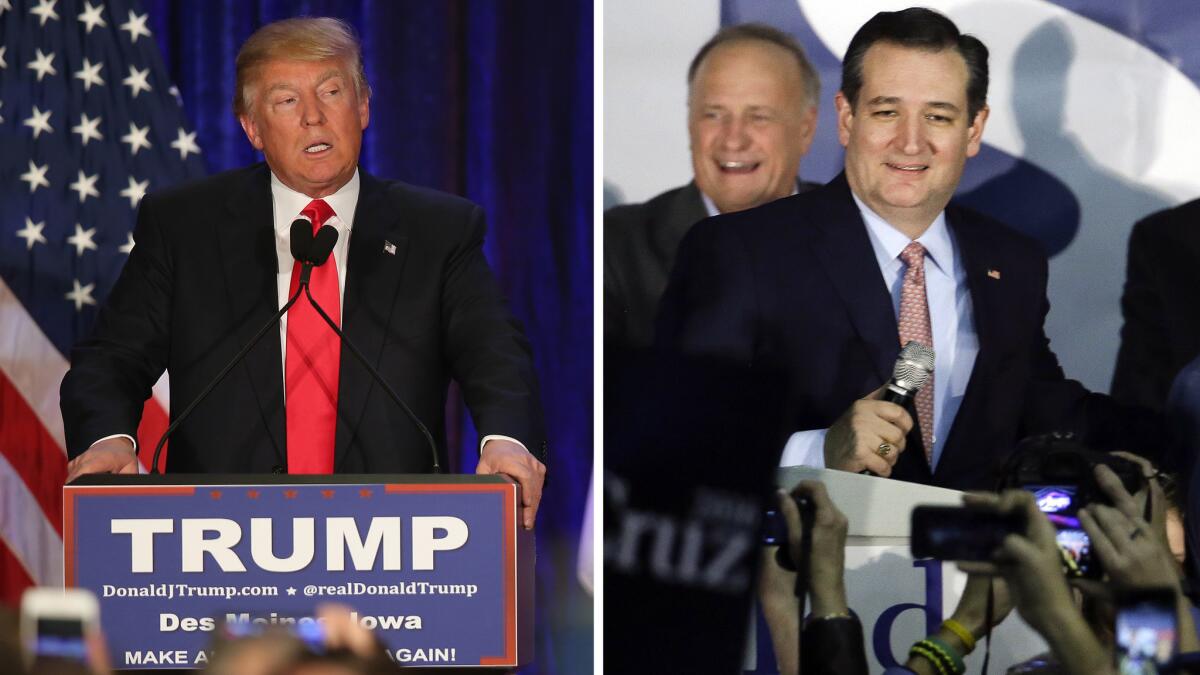
The dramatic results of Monday’s Iowa caucuses thrust the presidential contest forward to a state that promises a wildly different eight-day battle for its contrarian but deeply political voters.
Among Republicans, the race shifts onto ground dominated by more secular New Englanders after weeks of appeals to Iowa’s evangelical voters. A New Hampshire race that days ago appeared destined to define which of a quartet of establishment Republicans would rise to challenge Donald Trump will offer instead a battle between two young senators, Iowa winner Ted Cruz and third-place finisher Marco Rubio, for that mantle.
On the Democratic side, Hillary Clinton only barely escaped a second straight embarrassment at the hands of an upstart movement candidate by effectively tying with Vermont Sen. Bernie Sanders. Now she must fight him on his home turf of New England.
- Share via
Check out the results from the Iowa caucuses
- Share via
Republican race bunches into three-man fight
Texas Sen. Ted Cruz parlayed his socially conservative stance and fervent anti-Washington message into a slim victory Monday night in Iowa’s Republican caucuses, dealing a setback to billionaire Donald Trump in the first meaningful test of the 2016 presidential campaign.
Marco Rubio finished just behind Trump, a strong showing that could offer a big boost heading into next week’s New Hampshire primary and stamp the senator from Florida the front-runner among Republicans seeking an alternative to the more ideological Cruz and incendiary Trump.
The rest of the crowded Republican field finished far behind.
- Share via
Hillary Clinton holds slim lead in Iowa results
Hillary Clinton clung to the narrowest of leads as Iowa counted the returns from Monday’s precinct caucuses, seeking to hold off a strong challenge from Sen. Bernie Sanders with the support of older Democrats, self-described moderates and those who put a priority on a nominee with the experience to be president.
The razor-close vote count reflected an intense struggle that had tightened dramatically in recent weeks. But though Clinton’s lead was tiny — and a clear disappointment for her campaign — it was nonetheless crucial. With Sanders leading in polls in New Hampshire, whose Feb. 9 primary is the next nominating contest, a clear defeat for Clinton here would have resuscitated all the doubts that Democrats have had about her ability to inspire and motivate the party’s voters.
Now, though Sanders clearly has sufficient money and ardent backing of his liberal supporters to challenge Clinton for months, the pressure will shift to him.